| Srl | Item |
| 1 |
ID:
096866
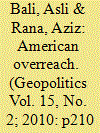

|
|
|
|
|
| Publication |
2010.
|
| Summary/Abstract |
This article argues that American actions in the Middle East designed to advance democracy and/or 'moderation' tend to yield perverse outcomes that frustrate the aspirations of local actors while undermining the values purportedly being promoted by the US. In order to explain these contradictions, we emphasise the linkage between policies of democracy promotion and long-standing American commitments both to millennialism and geographical omnipresence. As a result of these policies and geopolitical vision, we argue that 'democracy promotion' often devolves into a simple defence of American interest - by producing electoral outcomes intended to strengthen local agents seen as compliant with US regional priorities. In this context, the shift from democracy promotion to a policy of pursuing 'moderation' in the region, understood as support for American policies, is entirely coherent. Commentators tend to present this shift (particularly in the wake of the Iraq War) as recognition by US political actors of the imperial overtones embedded in more heavy-handed approaches to regime change. Yet, the call for moderation is itself profoundly intertwined with American millennial aspirations, while remaining remarkably devoid of clear content and thus equally amenable to manipulation for strategic ends. By way of conclusion, we suggest an alternative basis for a less intrusive American position in the region, one that rejects the need for an overstretched territorial presence and that is grounded in a substantive respect for local self-determination.
|
|
|
|
|
|
|
|
|
|
|
|
|
|
|
|
| 2 |
ID:
096875


|
|
|
| 3 |
ID:
096871


|
|
|
| 4 |
ID:
096874


|
|
|
| 5 |
ID:
096868
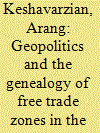

|
|
|
|
|
| Publication |
2010.
|
| Summary/Abstract |
Free trade zones have been championed by policy makers as important mechanisms for the "economic liberalisation" and "globalisation" of the Middle East. While a growing number of political economists have begun to investigate the performance of these projects, few have considered why states voluntarily limit their sovereign powers by establishing these liberalised territories. To address this question, this paper studies the Jebel Ali free trade zone in Dubai (UAE) and the Kish free trade zone in Iran, two of the earliest such projects in the region. Rather than being products of neoliberal ideology or pressure from advanced industrial economies, the essay argues that paradoxically these zones were developed by the Iranian state and Dubai emirate to project territorial sovereignty in turbulent geostrategic settings and moments as well as nodes to circulate rent to domestic and international members of ruling coalitions. The geostrategic and state-building logics informed when, where, and how these projects were developed. More generally, this analysis illustrates that the Middle East is neither absent from the process of globalisation, nor does it simply respond passively and reactively to this complex process. Free trade zones are an example of local strategies working in consort with international processes to fashion new forms of economic and political interconnectedness.
|
|
|
|
|
|
|
|
|
|
|
|
|
|
|
|
| 6 |
ID:
096872


|
|
|
| 7 |
ID:
096873
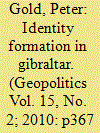

|
|
|
| 8 |
ID:
096865
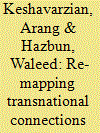

|
|
|
| 9 |
ID:
096870


|
|
|
| 10 |
ID:
096869


|
|
|
|
|
| Publication |
2010.
|
| Summary/Abstract |
Celebrants of neo-liberal globalisation and their critics ascribe to the rationality of finance capital enormous power. It opens new territories, produces new cultural forms and creates a hierarchy of cities and the spaces within them. How might this image change when viewed from spaces allegedly excluded from capitalist globalisation? For many, Lebanon during its 1975-1990 civil war was such a place. The international financial institutions and their Lebanese allies presented neo-liberal reform as the necessary prerequisite for post-conflict re-integration with rational processes of capitalist globalisation. Through a multi-sited political economy of one financial network operant in wartime Lebanon, I show that the "militia economy" was never outside larger processes of financial globalisation. I argue that it was integrated into a global realm consisting not of financial corporations operating according to a universal capitalist rationality, but rather one of similarly constituted networks of capitalists, companies and other institutions working within and alongside a variety of states in pursuit of politico-economic power.
|
|
|
|
|
|
|
|
|
|
|
|
|
|
|
|
| 11 |
ID:
096867
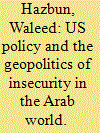

|
|
|
|
|
| Publication |
2010.
|
| Summary/Abstract |
In the wake of 9/11, President George W. Bush downplayed traditional 'realist' security concerns by defining America's goal as countering threats generated by the internal characteristics of Arab societies. Bush advanced a strategy of regional transformation based on regime change in Iraq and economic, social, and political reform across the Arab world. This strategy, however, failed to address the security interests of regional governments while generating insecurity for Arab societies. To explain these results, the article develops a framework for understanding the Middle East regional system that recognises the role of societal discourses of insecurity and the system's multipolar structure. The framework is used to suggest an alternative strategy for US Middle East policy. Rejecting both a renewed project of regional transformation and a return to neorealism, the paper outlines a strategy based on managing a multipolar, pluralist system.
|
|
|
|
|
|
|
|
|
|
|
|
|
|
|
|